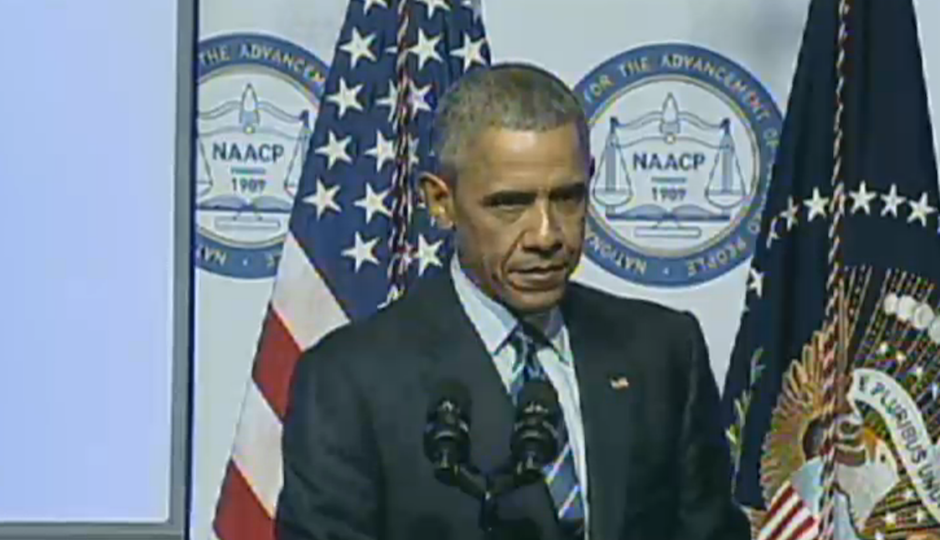Obama, in Philly, Calls for Transformation of Criminal Justice System

President Obama speaks Tuesday to the NAACP. (From the live video feed.)
President Obama called for an overhaul of the criminal justice system Tuesday in Philadelphia, telling the national convention of the NAACP that the current system is skewed by race and wealth.
He said more Americans had come to understand the need for reform ““partly because of cameras, partly because of tragedy, partly because the statistics cannot be denied anymore.”
Obama took the stage in the main hall nearly two hours after his scheduled 3:05 p.m. appearance, and launched quickly into the meat of his speech, rattling off a list of numbers and statistics to illustrate his point that criminal justice system has grown oppressive and costly:
- America’s prison population has quadrupled since 1980, standing at 2.2 million prisoners now.
- The U.S. has 5 percent of the world’s population and 25 percent of its prisoners — an imprisonment rate four times greater than China’s.
- The $80 billion spent on incarceration each year could fully fund universal pre-K for 3- and 4-year-olds, or eliminate tuition at public colleges and universities.
- The result? More than 1 million fathers are imprisoned.
“What is that doing to our communities? What is that doing to their children?” Obama said. “Mass incarceration makes our country worse off, and we’ve got to do something about it.”
He offered a three-pronged approach to reforming the system:
• In the community, invest more dollars to provide pro-K and summer jobs for teens — such programs cost less than imprisonment, he said.
“I we make investments in our children, we’ll reduce the need to incarcerate those kids,” he said. “Places like West Philly or West Baltimore or Ferguson, they’re America too.”
• In courtrooms, reduce and eliminate mandatory minimum sentences for nonviolent crimes, and invest in programs like drug courts, treatment, and expanded probation programs.
• And for those who do end up in prison, offer a patch back to citizenship — through real job-training programs, as well as “ban the box” laws that prohibit employers from asking about criminal records, and the renewal of voting rights once an offender has completed their sentence.
Obama also suggested reducing the use of solitary confinement, and urged a crackdown on prison abuses.
“While the people in our prisons have made mistakes — sometimes big mistakes — they are also Americans,” he said, later adding: “We should not be tolerating rape in prison, and we shouldn’t be tolerating jokes about it in our popular culture. It’s no joke, and it’s unacceptable.”
He said he would become the first sitting president to visit a federal prison, in a visit scheduled for Thursday. And he acknowledged that some prisoners will prove resistant to reform. “There are a lot of folks who belong in prison,” he said. “There are some folks who need to be in jail.”
But, he later added: “Any system that allows us to turn a blind eye to suffering and despair is not a justice system,” he said. “It’s an injustice system.”
He concluded by talking about four ex-convicts he met before Tuesday’s speech, all of whom had gone on to successful post-prison lives. One will graduate from Temple University this year, he said. ““Justice and redemption,” he said, “go hand in hand.”
The reaction
On social media, reaction was mixed:
"RT @fordm: Obama rattling off criminal-justice statistics you only heard from activists and academics five years ago at #NAACP106.
— Christine Sitzes (@sacourtreporter) July 14, 2015
The @POTUS we just heard at #NAACP106, that we'll hear discuss criminal justice reform, is the one you guys have been asking for.
— Ernest Ezeugo (@ErnestEzeugo) July 14, 2015
@POTUS As students we envision a world where POTUS addresses institutional racism from day one, not year 7. #NAACP106 #BetterLateThanNever
— L.E.A.D. (@LEAD_Shakopee) July 14, 2015
Something tells me a lot of white people are not gonna like reading the transcript of this speech. #NAACP106
— Watende Umi (@Rod_Noir) July 14, 2015
Truly blown away by @POTUS at #NAACP106 convention. Presidents rarely if ever address criminal justice reform and none so compellingly.
— Leslie Proll (@LeslieProll) July 14, 2015
https://twitter.com/Empress_Orit/status/621075431580663809
Follow @JoelMMathis on Twitter.


